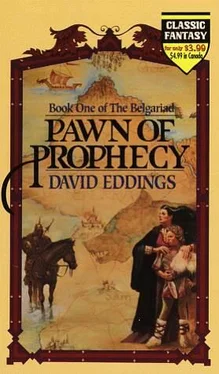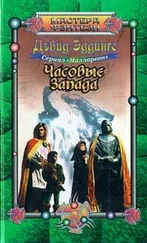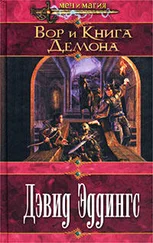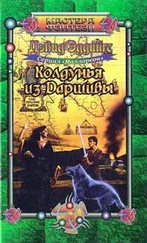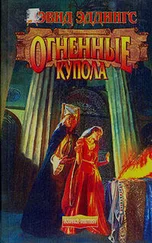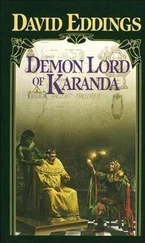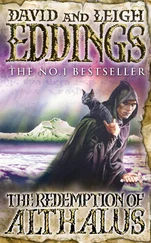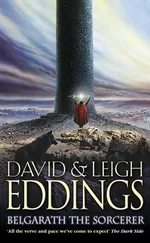David Eddings - Pawn of Prophecy
Здесь есть возможность читать онлайн «David Eddings - Pawn of Prophecy» весь текст электронной книги совершенно бесплатно (целиком полную версию без сокращений). В некоторых случаях можно слушать аудио, скачать через торрент в формате fb2 и присутствует краткое содержание. Жанр: Фэнтези, на английском языке. Описание произведения, (предисловие) а так же отзывы посетителей доступны на портале библиотеки ЛибКат.
- Название:Pawn of Prophecy
- Автор:
- Жанр:
- Год:неизвестен
- ISBN:нет данных
- Рейтинг книги:3 / 5. Голосов: 1
-
Избранное:Добавить в избранное
- Отзывы:
-
Ваша оценка:
- 60
- 1
- 2
- 3
- 4
- 5
Pawn of Prophecy: краткое содержание, описание и аннотация
Предлагаем к чтению аннотацию, описание, краткое содержание или предисловие (зависит от того, что написал сам автор книги «Pawn of Prophecy»). Если вы не нашли необходимую информацию о книге — напишите в комментариях, мы постараемся отыскать её.
Pawn of Prophecy — читать онлайн бесплатно полную книгу (весь текст) целиком
Ниже представлен текст книги, разбитый по страницам. Система сохранения места последней прочитанной страницы, позволяет с удобством читать онлайн бесплатно книгу «Pawn of Prophecy», без необходимости каждый раз заново искать на чём Вы остановились. Поставьте закладку, и сможете в любой момент перейти на страницу, на которой закончили чтение.
Интервал:
Закладка:
"What’s this mark, Aunt Pol?" he asked, holding his hand up, palm out.
She looked up from where she was brushing her long, dark hair.
"It’s nothing to worry about," she told him.
"I wasn’t worried about it," he said. "I just wondered what it was. Zubrette and Doroon think it’s a birthmark. Is that what it is?"
"Something like that," she said.
"Did either of my parents have the same kind of mark?"
"Your father did. It’s been in the family for a long time."
A sudden strange thought occurred to Garion. Without knowing why, he reached out with the hand and touched the white lock at his Aunt’s brow. "Is it like that white place in your hair?" he asked.
He felt a sudden tingle in his hand, and it seemed somehow that a window opened in his mind. At first there was only the sense of uncountable years moving by like a vast sea of ponderously rolling clouds, and then, sharper than any knife, a feeling of endlessly repeated loss, of sorrow. Then, more recent, there was his own face, and behind it more faces, old, young, regal or quite ordinary, and behind them all, no longer foolish as it sometimes seemed, the face of Mister Wolf. But more than anything there was a knowledge of an unearthly, inhuman power, the certainty of an unconquerable will.
Aunt Pol moved her head away almost absently.
"Don’t do that, Garion," she said, and the window in his mind shut.
"What was it?" he asked, burning with curiosity and wanting to open the window again.
"A simple trick," she said.
"Show me how."
"Not yet, my Garion," she said, taking his face between her hands. "Not yet. You’re not ready yet. Now go to bed."
"You’ll be here?" he asked, a little frightened now.
"I’ll always be here," she said, tucking him in. And then she went back to brushing her long, thick hair, humming a strange song as she did in a deep, melodious voice; to that sound he fell asleep.
After that not even Garion himself saw the mark on his own palm very often. There suddenly seemed to be all kinds of dirty jobs for him to do which kept not only his hands, but the rest of him as well, very dirty.
The most important holiday in Sendaria—and indeed in the rest of the kingdoms of the west—was Erastide. It commemorated that day, eons before, when the seven Gods joined hands to create the world with a single word. The festival of Erastide took place in midwinter, and, because there was little to do on a farm like Faldor’s at that season, it had by custom become a splendid two-week celebration with feasts and gifts and decorations in the dining hall and little pageants honoring the Gods. These last, of course, were a reflection of Faldor’s piety. Faldor, though he was a good, simple man, had no illusions about how widely his sentiments were shared by others on the farm. He thought, however, that some outward show of devotional activity was in keeping with the season; and, because he was such a good master, the people on his farm chose to humor him.
It was also at this season, unfortunately, that Faldor’s married daughter, Anhelda, and her husband, Eilbrig, made their customary annual visit to remain on speaking terms with her father. Anhelda had no intention of endangering her inheritance rights by seeming inattention. Her visits, however, were a trial to Faldor, who looked upon his daughter’s somewhat overdressed and supercilious husband, a minor functionary in a commercial house in the capital city of Sendar, with scarcely concealed contempt.
Their arrival, however, marked the beginning of the Erastide festival at Faldor’s farm; so, while no one cared for them personally, their appearance was always greeted with a certain enthusiasm.
The weather that year had been particularly foul, even for Sendaria. The rains had settled in early and were soon followed by a period of soggy snow—not the crisp, bright powder which came later in the winter, but a damp slush, always half melting. For Garion, whose duties in the kitchen now prevented him from joining with his former playmates in their traditional preholiday orgy of anticipatory excitement, the approaching holiday seemed somehow flat and stale. He yearned back to the good old days and often sighed with regret and moped about the kitchen like a sandy-haired cloud of doom.
Even the traditional decorations in the dining hall, where Erastide festivities always took place, seemed decidedly tacky to him that year. The fir boughs festooning the ceiling beams were somehow not as green, and the polished apples carefully tied to the boughs were smaller and not as red. He sighed some more and reveled in his sullen moping.
Aunt Pol, however, was not impressed, and her attitude was firmly unsympathetic. She routinely checked his brow with her hand for signs of fever and then dosed him with the foulest-tasting tonic she could concoct. Garion was careful after that to mope in private and to sigh less audibly. That dry, secret part of his mind informed him matter-of-factly that he was being ridiculous, but Garion chose not to listen. The voice in his mind was much older and wiser than he, but it seemed determined to take all the fun out of life.
On the morning of Erastide, a Murgo and five Thulls appeared with a wagon outside the gate and asked to see Faldor. Garion, who had long since learned that no one pays attention to a boy and that many interesting things may be learned by placing himself in a position to casually overhear conversations, busied himself with some small, unimportant chore near the gate.
The Murgo, his face scarred much like the face of the one in Upper Gralt, sat importantly on the wagon seat, his chain-mail shirt clinking each time he moved. He wore a black, hooded robe, and his sword was much in evidence. His eyes moved constantly, taking in everything. The Thulls, in muddy felt boots and heavy cloaks, lounged disinterestedly against the wagon, seemingly indifferent to the raw wind whipping across the snowy fields.
Faldor, in his finest doublet—it was after all Erastide—came across the yard, closely followed by Anhelda and Eilbrig.
"Good morrow, friend," Faldor said to the Murgo. "Joyous Erastide to you."
The Murgo grunted. "You are, I take it, the farmer Faldor?" he asked in his heavily accented voice.
"I am," Faldor replied.
"I understand you have a goodly number of hams on hand—well cured."
"The pigs did well this year," Faldor answered modestly.
"I will buy them," the Murgo announced, jingling his purse.
Faldor bowed. "First thing tomorrow morning," he said.
The Murgo stared.
"This is a pious household," Faldor explained. "We do not offend the Gods by breaking the sanctity of Erastide."
"Father," Anhelda snapped, "don’t be foolish. This noble merchant has come a long way to do business."
"Not on Erastide," Faldor said stubbornly, his long face firm.
"In the city of Sendar," Eilbrig said in his rather high-pitched, nasal voice, "we do not let such sentimentality interfere with business."
"This is not the city of Sendar," Faldor said flatly. "This is Faldor’s farm, and on Faldor’s farm we do no work and conduct no business on Erastide."
"Father," Anhelda protested, "the noble merchant has gold. Gold, father, gold!"
"I will hear no more of it," Faldor announced. He turned to the Murgo. "You and your servants are welcome to join us in our celebration, friend," he said. "We can provide quarters for you and the promise of the finest dinner in all of Sendaria and the opportunity to honor the Gods on this special day. No man is made poorer by attending to his religious obligations."
"We do not observe this holiday in Cthol Murgos," the scar-faced man said coldly. "As the noble lady says, I have come a long way to do business and have not much time to tarry. I’m sure there are other farmers in the district with the merchandise I require."
Читать дальшеИнтервал:
Закладка:
Похожие книги на «Pawn of Prophecy»
Представляем Вашему вниманию похожие книги на «Pawn of Prophecy» списком для выбора. Мы отобрали схожую по названию и смыслу литературу в надежде предоставить читателям больше вариантов отыскать новые, интересные, ещё непрочитанные произведения.
Обсуждение, отзывы о книге «Pawn of Prophecy» и просто собственные мнения читателей. Оставьте ваши комментарии, напишите, что Вы думаете о произведении, его смысле или главных героях. Укажите что конкретно понравилось, а что нет, и почему Вы так считаете.
